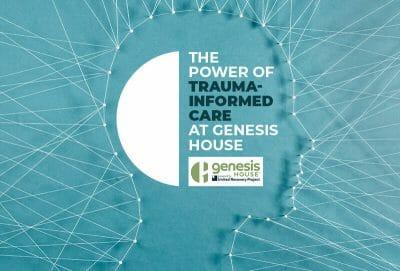As researchers learn more about the connection between trauma and addiction disorders, treatment programs have an opportunity to improve their services for trauma survivors.
The clinical team at Genesis House takes the needs of trauma survivors seriously. Because trauma is a major contributor to many kinds of addictions, Genesis House uses trauma-informed care as the foundation of addiction treatment. This approach opens the door for more people to get the help they need.
For many people, substance use is a coping mechanism they use to minimize the emotional and physical pain related to past trauma. It’s estimated that up to 75% of people who have experienced trauma develop addictions.
Trauma is an emotional reaction to a distressing event, such as childhood abuse, sexual assault, or domestic violence. Trauma can also result from the loss of a loved one, a sudden life change, or being in high-stress situations like combat.
Trauma can cause a range of negative emotions, such as anger, fear, anxiety, shame, and guilt. It can also trigger physical symptoms, like digestive issues and headaches.
Trauma-informed addiction treatment seeks to help individuals heal from trauma while also addressing their addiction issues. Failure to explore the cause of trauma or to help clients resolve their trauma-related issues increases the risk of relapse and leaves treatment incomplete.
Genesis House relies on a combination of traditional, evidence-based therapies to help their clients overcome addiction and live healthy, fulfilling lives. Incorporating trauma-informed therapies into customized treatment plans is a natural step in the organization’s never-ending quest to provide every individual with the care they need.
Trauma-informed care is best described as a collection of therapies and approaches meant to address the symptoms of trauma.
An equally important component of trauma-informed care is to avoid traumatizing the client in any way. Genesis House clinicians have undergone specialized training so they can recognize when a person’s trauma responses are being triggered.
If a client’s heart rate or respiration rate increases, these could be signs that the autonomic nervous system (part of the central nervous system) is being aroused. This type of arousal could mean their trauma response is being triggered.
Paying close attention to a client’s non-verbal and verbal signals is an example of the sensitivity level Genesis House clinicians must maintain to provide trauma-informed care.
Some of the most commonly relied upon trauma-informed therapy modalities at Genesis House include Eye Movement Desensitization and Reprocessing (EMDR), Dialectical Behavioral Therapy (DBT), Seeking Safety therapy, and animal-assisted therapy.
EMDR
This treatment helps clients process distressing memories through a combination of guided movements and recall. It is not a traditional form of talk therapy, though some talking is involved.
The techniques used in EMDR work to rewire the brain and decrease the emotional impact of traumatic memories. The therapy is frequently used to treat PTSD and anxiety disorders.
Dialectical Behavioral Therapy
DBT is based on cognitive-behavioral therapy and teaches people the skills they need to cope with uncomfortable emotions. Like traditional cognitive-behavioral therapy, DBT emphasizes an individual’s ability to change negative thinking and behavioral patterns through acceptance.
DBT was originally developed as a treatment for borderline personality disorder. Today, it is a common therapy for the trauma-informed treatment of addiction.
Seeking Safety
Seeking Safety is a skills-focused modality for helping individuals with a history of trauma and substance use disorders. The goal of Seeking Safety is to assist participants in the development of healthy coping skills. Seeking Safety therapy may be conducted in one-on-one or group therapy settings.
The team at Genesis House understands that simply entering a clinical environment can re-traumatize some survivors. That’s why they are committed to creating a warm, welcoming environment where clients collaborate with their care providers to create positive outcomes.
Personal empowerment is an important aspect of trauma-informed care. Clients receiving care at Genesis House are encouraged to participate actively in their treatment. Learning new coping skills and receiving non-judgmental support from clinicians and peers helps clients build the confidence they need to feel safe and secure.
Genesis House is proud to include trauma-informed care techniques as part of its effective, comprehensive programming.
